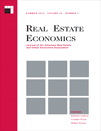
REAL ESTATE ECONOMICS
Scope & Guideline
Pioneering Studies at the Intersection of Economics and Real Estate
Introduction
Aims and Scopes
- Real Estate Market Dynamics:
The journal focuses on the mechanisms and factors that drive real estate markets, such as pricing, demand-supply relationships, and market cycles. - Impact of Policies and Regulations:
Research often explores the effects of government interventions, zoning laws, and housing policies on market outcomes and housing affordability. - Socioeconomic Influences:
Papers examine how demographic changes, income disparities, and social dynamics shape housing demand, investment patterns, and neighborhood characteristics. - Technological Integration:
The journal includes studies on the adoption of technology in real estate transactions, property management, and market analysis, highlighting innovations like machine learning and online platforms. - Environmental and Sustainability Considerations:
Research increasingly addresses the intersection of real estate with environmental risks, climate change, and sustainability practices within the housing sector. - Behavioral Economics in Real Estate:
The journal incorporates insights from behavioral economics to understand decision-making processes of buyers, sellers, and investors in the real estate market.
Trending and Emerging
- Climate Change and Real Estate:
There is a growing emphasis on the impact of climate change on real estate values, investment risks, and market dynamics, as evidenced by studies on climate risk in mortgage markets and housing adjustments in response to environmental changes. - Technology in Real Estate:
The integration of advanced technologies such as machine learning and big data analytics in real estate investment and market analysis is a rapidly emerging theme, indicating a shift towards more data-driven decision-making. - Social Equity and Housing Affordability:
Research focusing on social equity, housing affordability, and the effects of policies like rent control on different demographics is on the rise, reflecting broader societal concerns around housing access. - Health and Housing Interactions:
The intersection of housing conditions and health outcomes is gaining traction, with studies exploring how housing quality and affordability affect public health and well-being. - Urbanization Trends and Housing Supply:
As urbanization continues to shape housing demand, research exploring how cities accommodate growth and the implications for housing supply is increasingly relevant.
Declining or Waning
- Traditional Mortgage Analysis:
Research specifically focused on conventional mortgage products and their performance metrics has decreased, as newer studies explore alternative financing options and the impacts of non-traditional lending. - Static Market Models:
Papers employing static models of real estate valuation and investment analysis are becoming less common, with a growing preference for dynamic and complex modeling approaches that account for market volatility. - Historical Comparisons:
While historical analyses of past housing crises remain relevant, the frequency of papers focusing solely on historical comparisons has dwindled in favor of contemporary case studies and real-time data analysis. - Local Market Specifics:
Research centered exclusively on localized housing markets without broader implications or comparative analyses is declining, as there is a shift towards understanding broader regional or global trends. - Rural Housing Issues:
Topics specifically focused on rural housing markets and their unique challenges have seen a significant reduction, possibly overshadowed by urban-centric studies.
Similar Journals

Journal of Corporate Real Estate
Advancing Knowledge in Business Real Estate Strategies.Journal of Corporate Real Estate, published by EMERALD GROUP PUBLISHING LTD, is a leading peer-reviewed journal that focuses on the evolving landscape of corporate real estate practice and research. Established in 1998, this esteemed journal has carved out a vital niche within the fields of Business, Management, and Finance, as indicated by its impressive Q2 ranking in both categories as of 2023. With an ISSN of 1463-001X and an E-ISSN of 1479-1048, this journal is dedicated to disseminating original research, case studies, and theoretical contributions that drive innovation and strategic thinking in corporate real estate management. While the journal does not currently offer open access options, it remains an invaluable resource for researchers, professionals, and students alike, aiming to enhance their understanding of real estate's critical role in business strategy. With a publication trajectory extending to 2024, the Journal of Corporate Real Estate stands at the forefront of academic discourse, fostering advanced scholarship and practical insights essential for navigating the complexities of corporate real estate.
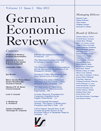
German Economic Review
Bridging Theory and Application in the Economic SphereGerman Economic Review is a distinguished academic journal published by WALTER DE GRUYTER GMBH, focusing on diverse aspects of economics and econometrics. With its ISSN 1465-6485 and E-ISSN 1468-0475, the journal serves as a vital platform for disseminating high-quality research from both established scholars and emerging voices in the economic field. Housed in the UK, the journal contributes significantly to the academic community, evidenced by its placement in the Q3 category for Economics and Econometrics in 2023 and its Scopus ranking of #381 out of 716, reflecting its impactful presence in the discipline. German Economic Review does not offer open access options; however, its convergence from 2001 to 2024 indicates a long-standing commitment to advancing economic discourse. This journal is ideal for researchers, professionals, and students eager to engage with contemporary economic theories and applications.
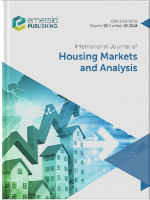
International Journal of Housing Markets and Analysis
Shaping the Future of Housing Market AnalysisInternational Journal of Housing Markets and Analysis, published by EMERALD GROUP PUBLISHING LTD, is a leading academic journal that focuses on the multifaceted dynamics of housing markets across the globe. Since its inception in 2008, this journal has been a significant resource for researchers, professionals, and students interested in the intersection of housing economics and societal impact. With a commendable Q2 ranking in the field of Economics, Econometrics and Finance and a solid position in the Scopus rankings, it contributes vital insights and empirical studies that inform policy-making and market analysis. The journal emphasizes rigorous research methodologies and theoretical advancements, providing an excellent platform for the dissemination of knowledge related to housing market trends, valuation, and the socio-economic factors influencing housing dynamics. Although not an open-access journal, it caters to a wide audience eager to deepen their understanding of housing economics through robust analytical frameworks and case studies. This journal's ongoing commitment to scholarly excellence underlines its importance as a key reference point in housing market research until at least 2024 and beyond.
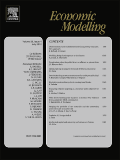
ECONOMIC MODELLING
Shaping Economic Understanding with Empirical Excellence.ECONOMIC MODELLING, published by Elsevier, is a leading academic journal in the field of Economics and Econometrics, with a commendable impact factor that underscores its significance within the research community. Since its inception in 1984, this journal has been pivotal in disseminating high-quality research that contributes to the advancement of theoretical and empirical methodologies in economics. As a Q1 journal in its category, it ranks in the top 88th percentile according to Scopus, solidifying its reputation as an influential platform for economists and academicians. Although it does not offer open access, the journal maintains a robust subscription model, ensuring wide distribution of critical insights and findings. Researchers, practitioners, and students are encouraged to engage with the latest developments in economic modelling, making ECONOMIC MODELLING an essential resource for anyone seeking to understand and contribute to the evolving landscape of economic theory and application.
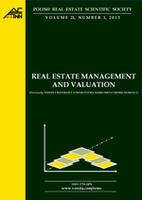
Real Estate Management and Valuation
Empowering Researchers in Real Estate Valuation.Real Estate Management and Valuation, published by WALTER DE GRUYTER GMBH, is an Open Access journal that has been providing scholarly insights since 2013. Based in Poland, this journal serves as a critical platform for researchers, professionals, and students interested in the multifaceted domains of real estate management and valuation. With its ISSN 1733-2478 and E-ISSN 2300-5289, the journal aims to disseminate original research and review articles that contribute to the understanding of economic, financial, and marketing strategies in real estate. Although it currently holds a Q4 ranking in several categories, including Economics and Finance, the journal is committed to enhancing its academic impact and relevance within these fields. Its scope spans various aspects of real estate, aiming to foster knowledge dissemination across global contexts, making it an essential resource for engaged scholars and practitioners.

JOURNAL OF ECONOMICS AND BUSINESS
Illuminating the Path to Economic UnderstandingJOURNAL OF ECONOMICS AND BUSINESS, published by Elsevier Science Inc, stands as a leading platform for the dissemination of research in the fields of economics and business management. With an ISSN of 0148-6195, this journal is indexed in Scopus and boasts impressive rankings, including a position in the top 20% for both Finance and Economics and Econometrics. With a consistent publication history since 1978, it has become a vital resource for scholars and practitioners alike, providing insights into contemporary issues and emerging trends in the economic landscape. The journal, categorized in the Q2 quartile for both Business and Economics, invites rigorous research that advances theoretical and practical knowledge. While it operates under a subscription model, its notable impact factor reflects its significance and relevance in addressing critical questions within the business and economics domains. Whether you are a researcher, a business professional, or a student eager to deepen your understanding, the JOURNAL OF ECONOMICS AND BUSINESS is an essential resource for your academic and professional journey.

EKONOMICKY CASOPIS
Empowering Economic Insights for Tomorrow's ChallengesEKONOMICKY CASOPIS is a distinguished journal published by the Institute of Economics Research SAS and the Institute of Forecasting CSPS SAS, offering a comprehensive platform for the dissemination of innovative research in the field of economics and econometrics. Since its inception in 1978, the journal has been committed to fostering scholarly discourse, showcasing empirical studies, theoretical advancements, and policy analyses that contribute to the understanding of economic phenomena. Although categorized in the Q4 quartile in 2023 and ranking in the lower percentiles within Scopus, EKONOMICKY CASOPIS remains a critical resource for researchers and practitioners seeking to engage with the economic challenges of our time. As the journal continues to evolve through 2024, it invites contributions that align with its objectives of enhancing economic insights and promoting academic discussion in Slovakia and beyond. For researchers looking to publish their work or expand their knowledge, EKONOMICKY CASOPIS serves as a vital resource in the expanding landscape of economic research.

Journal of Structured Finance
Illuminating Pathways in Financial DerivativesThe Journal of Structured Finance, published by PAGEANT MEDIA LTD, is a pivotal resource for professionals and academics engaged in the finance sector. With its ISSN 1551-9783 and E-ISSN 2374-1325, this journal explores cutting-edge concepts in structured finance, offering insights into risk management, financial derivatives, and innovative financing strategies. As of 2023, it proudly holds a Q3 ranking in the finance category, with a Scopus rank of #280 out of 317, contributing valuable perspectives in a competitive field. Operating from the United States and serving a global audience, the journal encourages research that bridges theoretical foundations and practical applications, enhancing the understanding of complex financial instruments. With no Open Access options currently available, readers can access this valuable content through institutional subscriptions or individual purchases, reaffirming its relevance and importance for researchers, professionals, and students alike who seek to navigate the dynamic world of finance.

Geo UERJ
Empowering Scholars with Open Access KnowledgeGeo UERJ is a renowned open-access journal published by Universidade do Estado do Rio de Janeiro (UNIV ESTADO RIO JANEIRO), focused on the multifaceted study of geography and related disciplines. Established to foster innovation and disseminate high-quality research, Geo UERJ has been dedicated to making scholarly work accessible since its transition to open access in 2007. The journal aims to provide a platform for researchers, professionals, and students to share insights into geographical phenomena, environmental issues, and urban studies, contributing to the global discourse on sustainability and spatial analysis. Its publications serve as valuable resources for academicians looking to stay abreast of cutting-edge developments within the geography field. With the ISSN 1415-7543 and E-ISSN 1981-9021, Geo UERJ invites contributions from diverse perspectives, enriching the academic landscape with important geographic research from Brazil and beyond.

Journal of Property Investment & Finance
Transforming Insights into Actionable Investment StrategiesJournal of Property Investment & Finance, published by EMERALD GROUP PUBLISHING LTD, serves as a leading platform dedicated to advancing the field of real estate investment and financial analysis. Since its inception in 1999 and continuing through 2024, this esteemed journal has remained at the forefront of academic research, addressing essential topics within the realms of business, economics, and finance, as evidenced by its impressive Q2 rankings in multiple relevant categories. Researchers and practitioners alike can benefit from its findings, which emphasize innovative methods, strategic insights, and emerging trends that shape the property investment landscape. The journal is accessible for subscription, ensuring that professionals and students stay connected to the latest scholarly discussions and practical applications. With an established reputation backed by its ranking in the Scopus database, positioning it in the 77th percentile for economics, the Journal of Property Investment & Finance is indispensable for those wishing to deepen their understanding and proficiency in property investment and finance.